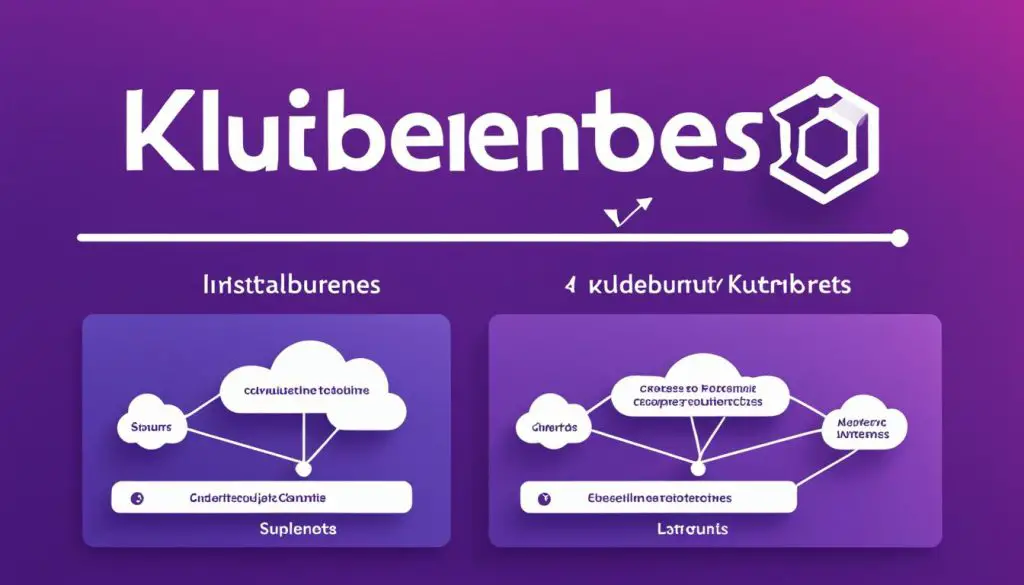Install Kubernetes on Ubuntu 24: Step-by-Step Guide
Are you ready to learn Kubernetes on Ubuntu 24? This Kubernetes setup tutorial is perfect for DevOps engineers and developers. It helps you navigate each step carefully. Kubernetes is key for managing complex containerized applications. This guide simplifies setting up Kubernetes on Ubuntu 24. It’s a popular choice among tech experts. You’ll learn how Kubernetes orchestrates containerized apps and the steps for a successful install. We cover important topics like disabling swap, setting up node hostnames, and configuring key components.
Want to know the secrets of a smooth Kubernetes setup? Keep reading to learn how to make your Ubuntu 24 system a powerful Kubernetes cluster. Discover our comprehensive guide for a seamless setup of your containerized environments today.
Key Takeaways
- Understand the essentials of Kubernetes and its role in modern application deployment.
- Get detailed Ubuntu 24 Kubernetes setup instructions.
- Learn to disable swap to meet Kubernetes’ resource management requirements.
- Set up unique hostnames for efficient node communication.
- Configure kubelet, kubeadm, and kubectl effectively to manage your Kubernetes cluster.
- Address common installation issues and get troubleshooting tips.
- Enhance and scale your Kubernetes cluster for a production environment.
Follow this guide for a smooth Kubernetes installation on Ubuntu 24. Your journey to mastering Kubernetes starts now!
Introduction to Kubernetes
Kubernetes was first thought of by Google and is now kept up by the Cloud Native Computing Foundation (CNCF). It’s an open-source tool that helps automate how containers are deployed, scaled, and managed. The Kubernetes installation guide is key to learning how to set it up right. Here, I’ll give a brief overview of what Kubernetes is and its main benefits.
What is Kubernetes?
Kubernetes makes managing complex infrastructure easier, letting users focus on building apps that scale well and are strong. It’s like a control center for managing apps in containers across many hosts. This ensures apps use resources well and work smoothly together. You can find expert tips for installing Kubernetes on Ubuntu to learn more about this process.
Benefits of Kubernetes
Kubernetes has many advantages. It can manage containers on different nodes and works well with various cloud environments, making it very portable. It can also scale apps automatically based on how much resources they need, keeping performance high even when loads change. Plus, it can restart failed containers and move them to other nodes, making it very reliable.
By checking out this Kubernetes installation guide and using expert tips for installing Kubernetes on Ubuntu 24, you can use Kubernetes to its fullest. It’s great for scaling simple apps or complex ones across different clouds, offering a full solution for modern software development.
Prerequisite for Installing Kubernetes on Ubuntu 24
To start setting up Kubernetes on Ubuntu 24, you need to meet some basic requirements. These steps make the installation smooth and help your Kubernetes cluster work better.
Hardware Requirements
For an easy Kubernetes installation on Ubuntu 24, your system needs at least 2 CPUs and 2GB of RAM. Also, make sure you have 2GB of free disk space. A good internet connection is key for downloading what you need during setup.
Software Requirements
To follow Kubernetes installation best practices, you must have:
- Ubuntu 24 operating system, updated to the latest version.
- Essential tools like curl, apt-transport-https, and gnupg installed.
- Each system should have a unique hostname set up correctly.
- Swap should be disabled for better performance. Check the Docker installation guide for more on dependencies.

Step-by-Step Process to Install Kubernetes on Ubuntu 24
To get Kubernetes on Ubuntu 24 right, you need a detailed guide. I’ll walk you through each step for a smooth setup.
Disable Swap
First, disable swap to avoid wrong scheduling by Kubernetes. This keeps your system running well. Use this command to turn swap off:
1 | <code> |
1 | swapoff -a |
Set Up Hostnames
Next, give each node a unique name. This makes managing your cluster easier. Use
1 | hostnamectl |
to set names:
1 | sudo hostnamectl set-hostname master-node |
1 | sudo hostnamectl set-hostname worker-node-1 |
Configure IPv4 Bridge
Next, set up an IPv4 bridge for node communication. Enable kernel modules and adjust sysctl settings. Add these lines to
1 | /etc/sysctl.d/k8s.conf |
:
Install Kubernetes Components
Then, install key Kubernetes tools like kubelet, kubeadm, and kubectl. These are crucial for your Kubernetes setup. Use these commands:
1 | sudo apt-get update && sudo apt-get install -y apt-transport-https curl |
1 | sudo curl -s https://packages.cloud.google.com/apt/apt-key.gpg | apt-key add - |
1 | sudo apt-add-repository "deb http://apt.kubernetes.io/ kubernetes-xenial main" |
1 | sudo apt-get update |
1 | sudo apt-get install -y kubelet kubeadm kubectl |
Install Docker
Docker is key for running containers. Install it with these commands:
1 | sudo apt-get install -y docker.io |
Start and enable Docker:
1 | sudo systemctl enable docker |
1 | sudo systemctl start docker |
Initialize Kubernetes Cluster
Start the Kubernetes master node setup. This involves setting up key configurations. Use this command:
1 | sudo kubeadm init --pod-network-cidr=192.168.0.0/16 |
To use kubectl without being root, do these steps:
1 | mkdir -p $HOME/.kube |
1 | sudo cp -i /etc/kubernetes/admin.conf $HOME/.kube/config |
1 | sudo chown $(id -u):$(id -g) $HOME/.kube/config |
Join Worker Nodes
Join worker nodes to the master. Use the token from the master setup:
1 | <code>sudo kubeadm join |
master-node-ip
1 | <code>:6443 --token |
your-token
1 | <code> --discovery-token-ca-cert-hash sha256: |
your-hash
Follow these steps for a successful Kubernetes deployment on Ubuntu 24. You’ll get a stable, scalable cluster.
Common Issues and Troubleshooting Tips
Even the best-planned Kubernetes setup on Ubuntu 24 can face problems. Let’s look at common issues and how to fix them.
Handling Installation Errors
Installation errors during the initial Kubernetes setup on Ubuntu 24 happen often. These errors usually come from not meeting the requirements or not following the setup steps. Make sure all hardware and software needs are met to lower these errors. For a step-by-step guide, check this resource.
Network Configuration Issues
Network problems can be big hurdles in Kubernetes installation. It’s key to check and fix any bridge settings and host file errors. Correct network setup is vital for Kubernetes to work well. For tips on avoiding these issues, look here.
Cluster Initialization Problems
Initialization problems with the Kubernetes cluster are common. These usually come from wrong component settings or network policies. Check these settings and network policies to fix these issues. If you’re having trouble with Kubernetes installation, focus on these areas for a stable cluster setup.
Knowing about these Kubernetes setup issues and how to fix them can make setting up a reliable Kubernetes environment easier. For more information and detailed steps, see here.
Conclusion
After following this guide, you should know how to install Kubernetes on Ubuntu 24. Kubernetes is a key tool for managing containers. It makes deploying and managing applications easier in your setup.
Setting up Kubernetes on Ubuntu 24 can be tricky, but knowing how to fix problems helps keep your setup running well. You can handle issues like installation errors and network problems with the right skills. For more help, check out additional resources that offer detailed solutions.
Using Kubernetes means you’re entering a world of efficient app management. This guide gives you the steps and tips for a successful Ubuntu 24 Kubernetes installation. As you keep learning and using these tools, you’ll see big improvements in how you deploy apps and manage your infrastructure.
FAQ
What are the hardware requirements for installing Kubernetes on Ubuntu 24?
Why is it necessary to disable swap before installing Kubernetes?
How do I set up hostnames for Kubernetes nodes?
What is the purpose of configuring the IPv4 bridge?
Which components are needed to install Kubernetes on Ubuntu 24?
How do I initialize the Kubernetes cluster on the master node?
How do I join worker nodes to the Kubernetes cluster?
What are common challenges during Kubernetes installation?
How can I troubleshoot network configuration issues?
What should I do if I encounter initialization problems with the Kubernetes cluster?
What best practices should I follow for a successful Kubernetes installation on Ubuntu 24?
Source Links
- https://www.cherryservers.com/blog/install-kubernetes-on-ubuntu
- https://ubuntu.com/kubernetes/install
- https://medium.com/@supportfly/how-to-install-kubernetes-on-ubuntu-11c2901fb659
- About the Author
- Latest Posts
Mark is a senior content editor at Text-Center.com and has more than 20 years of experience with linux and windows operating systems. He also writes for Biteno.com






